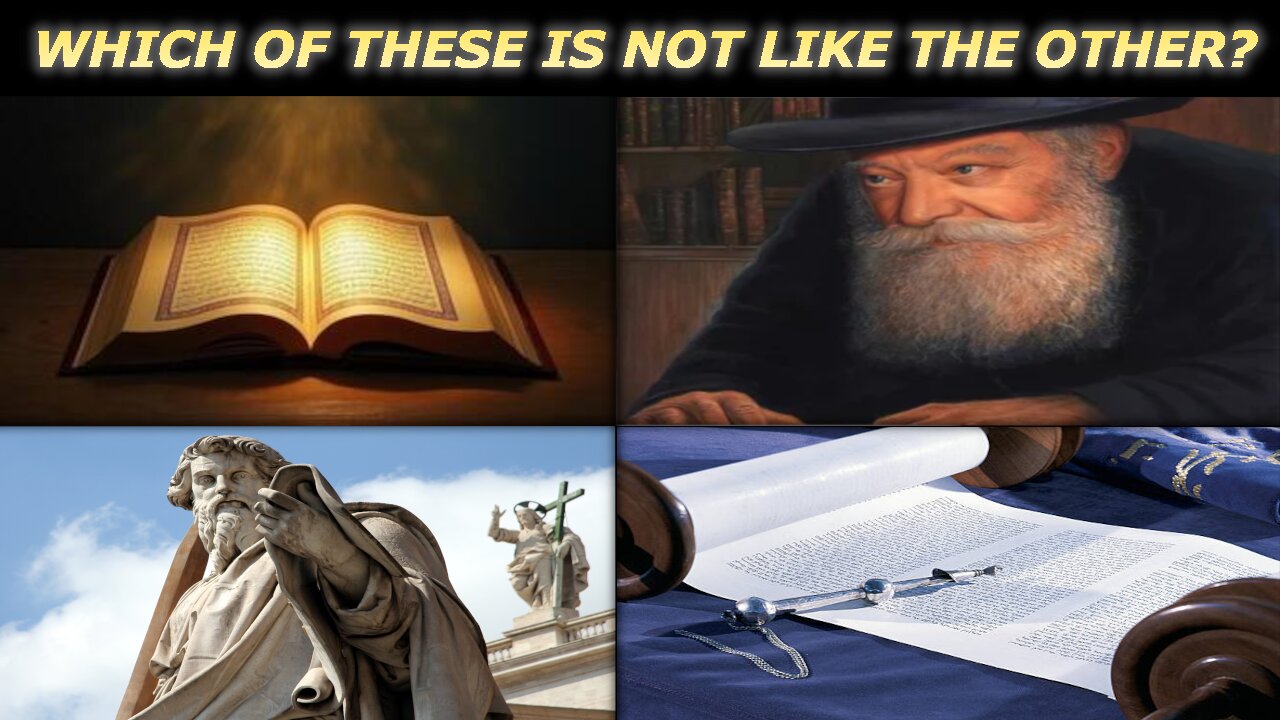Premium Only Content

Was Jesus a Muslim?
Islam’s portrayal of biblical prophets as Muslims may seem anachronistic or revisionist at first blush. However, it is actually the contrary. Islam criticizes Judaism and Christianity for being anachronistic and revisionist, since Abraham was neither a Jew (named after Judah) nor a Christian; nor did he speak a “foreign tongue” (Qur’an 16:103), namely Phoenician or Greek. Rather, he was a Muslim (3:67)—i.e., “perfect”. Islam further maintains that the deen (law) of God has always been “to be perfect” (Islam), as God commands Abraham in Genesis 17:1 to “Walk before me and be perfect” (tameem). The Qur’an likewise states that Abraham fulfilled (atimma) God’s commandments (2:124) and that God perfected (atimma) the deen (law) of Islam (5:5), whence Muslim (Heb. mushlam) or musallam (Qur’an 2:71; cp. Numbers 19:2 & Ephesians 5:27). In particular, Islam resolves legal and doctrinal issues concerning which Jews and Christians differed (Qur’an 22:76). For instance, it repudiates the trinity (Qur’an 5:73), increases daily prayers from three (Daniel 6:10) to five (Bukhari 97:142; i.e., the perfect Yom Kippur prayer) and includes pilgrimage to Baka (Qur’an 3:94, Psalm 84:6, 2:196) and Jerusalem (Ibn Majah 5:607). Such dispensations do not abrogate or derogate from the Law, since they include former dispensations (e.g., Qur’an 2:183), while dispensing of particularities and novelties (Qur’an 3:93) and restoring the original and universal laws (Qur’an 5:90-91). This is consistent with Jesus’ saying that believers’ righteousness must surpass the Pharisees’, who observed the Law (Matthew 5:20; cp. Luke 18:9-14). Pauline Christianity, by contrast, denigrates and abolishes the Law on the pretext of fulfilling it. Muhammad rose during the reign of Heraclius, whom Jews regarded as Armilus—an antichrist (Sefer Zerubbabel)—and who declared that he would eradicate circumcised people (i.e., Jews and Arabs). See Bukhari 7:1 and Walter Kaegi, Byzantium and the Early Islamic Conquest (CUP, 2000) at 194. Contemporary Jews and Arabs especially anticipated the coming of a prophet-warrior (Bukhari 63:131 & 65:7) from Mt. Sela (Ethribus) (Isaiah 42:11 & al-Adab al-Mufrad 12:9) who would be a “light to the nations” (Isaiah 42:6) and “triumph over his enemies” (id. 42:14). Muhammad was correspondingly greeted in Medina with the song Tala’al-Badr (id. 42:10). He and his successors and followers subdued the “beasts” or evil empires in the vision of Daniel (ch. 7), as he is supposed to have predicted (an-Nasa’i 25:92). However, Muhammad ultimately pardoned his enemies, who embraced Islam in droves, instead of slaughtering them (Qur’an 110). Only a few decades after his ministry began, almost the entire Middle East and North Africa (the biblical world) became Muslims with barely any resistance, as John Bar Penkaye (7th c.) wrote: "[T]he children of Hagar at once gained control over more or less the whole world [. . .]. We should not think of [their] advent as something ordinary, but as due to divine working. [. . .] [T]hese people came, at God’s command, [. . .], not with any war or battle [. . .]. God put victory into their hands in such a way that [. . .] “One man chased a thousand and two routed ten thousand” [Deuteronomy 32:30].” See Kaegi, supra at 216. Jews and Christians thus saw Muhammad as fulfilling the promise of a “great nation” to Ishmael (Genesis 17:20) as Moses fulfilled the promise of a “holy nation” to Israel (Exodus 19:6). So, to answer the hypothetical question whom Jesus or Moses would follow today, it is likely that Moses would believe Muhammad, since Moses could not convince the Egyptians—let alone Israelites, MENA or the world—to believe, not even with all the miracles he is supposed to have performed (Mishkat al-Masabih 1:185). Jesus, on the other hand, would not likely associate with Jews or Christians who curse him or his antecedents and sought to torture and kill him. What is certain at any rate is that if Muhammad was not a prophet by any definition, then neither were his predecessors whose putative accomplishments he eclipses and existence is far more difficult to doubt. It should finally be borne that people from MENA are the original Jews and Christians to whom this cultural legacy belongs. Beowulf and Aborigines (the bulk of today’s missionaries since the fall of Rome) would not become Christians or the “Lost Tribes” until many centuries—and genocides—later.
0:00 Outline
0:27 Muhammad and Jesus
8:29 Contemporary non-Muslim witnesses
13:23 What law did Jesus follow?
15:52 Paul the “False Prophet” and “the Samaritan”
19:38 Why is Pauline theology so full of contradictions?
26:27 Was Jesus a Muslim?
-
 2:08:19
2:08:19
Side Scrollers Podcast
1 day agoNetflix Execs to TESTIFY Over LGBTQ Agenda + IGN DESTROYS Xbox Game Pass + More | Side Scrollers
79.6K23 -
 5:08:55
5:08:55
Dr Disrespect
23 hours ago🔴LIVE - DR DISRESPECT - BABY STEPS - THE VERY VERY LAST CHAPTER
159K19 -
 10:28
10:28
BlabberingCollector
18 hours agoAsk Blabs, Episode 5 | Answering Your Wizarding World Related Questions
30.1K3 -
 18:09
18:09
Forrest Galante
5 days agoI Survived 24 Hours In The World's Deadliest Jungle
209K33 -
 LIVE
LIVE
Lofi Girl
2 years agoSynthwave Radio 🌌 - beats to chill/game to
196 watching -
 2:15:09
2:15:09
Badlands Media
22 hours agoOnlyLands Ep. 27: Power Hour Hangover, Trump’s Wartime Shift, and Portland in Flames
137K37 -
 22:21
22:21
DeVory Darkins
12 hours ago $23.88 earnedRioters attack Portland ICE Facility as Democrats make shocking admission
40.2K159 -
 2:06:06
2:06:06
TimcastIRL
15 hours agoTrump DOJ Announces INTERVENTION In Portland Over Nick Sortor Arrest | Timcast IRL
266K483 -
 6:53:58
6:53:58
SpartakusLIVE
16 hours ago#1 All-American HERO with LUSCIOUS hair and AVERAGE forehead brings Friday Night HYPE
74.8K7 -
 3:06:43
3:06:43
Laura Loomer
14 hours agoEP147: Islamic Terror EXPLODES In The West After UK Synagogue Attack
59.1K51
